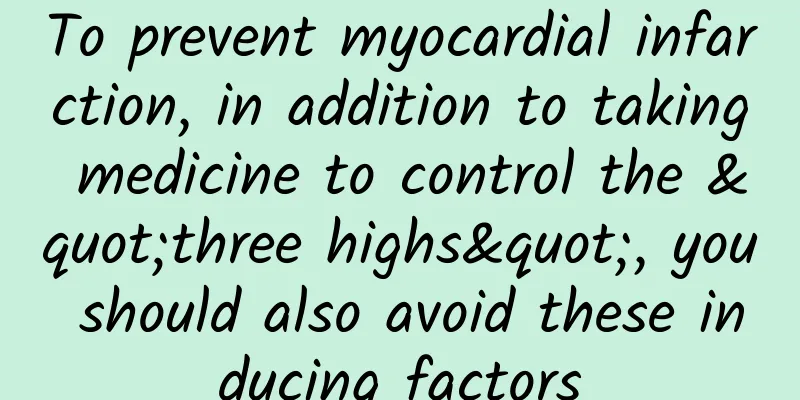To prevent myocardial infarction, in addition to taking medicine to control the "three highs", you should also avoid these inducing factors

|
A man in his 60s was sent to the hospital by his family because of severe diarrhea. However, when the doctor examined him, he found that he also had symptoms such as severe pain in the precordial area, chest tightness, shortness of breath, and sweating. After examination, he was diagnosed with acute myocardial infarction. After an interventional surgery to insert a stent, he was finally out of danger. The family members were somewhat confused as to why diarrhea could lead to a heart attack. The doctor explained that diarrhea can lead to severe dehydration, a sudden decrease in blood volume, a sharp drop in coronary blood flow, and myocardial hypoxia and ischemia. If the patient already has cardiovascular disease, it may induce acute myocardial infarction. 1. He suffered because he didn’t want to waste food. Later, we learned that the old man had a party with his relatives during the Chinese New Year and cooked a large table of food. As a result, he didn’t finish the food, and he didn’t want to waste it, so he didn’t want to throw it away, so he kept it for himself to eat slowly. Over time, the food went bad, resulting in severe diarrhea, which in turn caused acute myocardial infarction. The old man had a history of hypertension for more than 10 years and had not received standardized treatment. He said that he felt a dull pain in his chest when he was active a year ago, which could only be relieved after rest. In subsequent examinations, it was found that the old man's blood lipids and blood sugar levels were also beyond the normal range, and the coronary artery stenosis caused by atherosclerosis had exceeded 50%, and had progressed to coronary heart disease. 2. Coronary atherosclerosis is a risk factor for myocardial infarction. Most myocardial infarctions are caused by the rupture of atherosclerotic plaques in the coronary arteries. Because the surface of atherosclerotic plaques is covered with a layer of fibrous caps, which are not normal arterial intima, some fibrous caps are thin and prone to rupture, which can induce platelets to aggregate and form thrombi, causing blood vessel blockage. The cause of coronary atherosclerosis is closely related to the "three highs". For example, the old man's high blood pressure will cause mechanical damage to the arterial intima, and cholesterol will enter the arterial intima from the damaged area, causing atherosclerosis. The higher the blood pressure, the more severe the damage to the arteries and the more severe the degree of atherosclerosis. Excessive blood sugar can also damage the arterial lining and cause atherosclerosis. Diabetes, which causes high blood sugar, has been regarded by the medical community as a "risk-equal disease" to coronary heart disease, meaning that diabetes is as dangerous as coronary heart disease and can also damage the cardiovascular system, and diabetic patients are more likely to develop coronary heart disease. Dyslipidemia is a direct factor in atherosclerosis. Low-density lipoprotein cholesterol (LDL-C) in blood lipids is the "raw material" for the formation of the lipid core of plaques. The higher the LDL-C level, the faster the progression of atherosclerosis and the more severe the degree. If LDL-C is controlled at a lower level through medication, plaques can be reversed. In addition to the "three highs", smoking is also an important factor in causing atherosclerosis. Among young and middle-aged patients with acute myocardial infarction, smoking is the main cause. Obesity, alcoholism, lack of exercise, and genetics are also risk factors. 3. Avoid the factors that trigger myocardial infarction People who have coronary atherosclerosis or have developed coronary heart disease will not necessarily suffer from myocardial infarction. In fact, only a few people will suffer from myocardial infarction. Most people's coronary plaques are very stable and will not rupture even if the heart beats 100,000 times a day. Plaque rupture can usually only occur under the stimulation of certain factors. 1. Emotional excitement: Emotional excitement is the most common cause. When patients are in a state of rage, tension, fear, etc., their nerves become excited, which increases the secretion of adrenaline and norepinephrine, which in turn speeds up the heartbeat, constricts blood vessels, and increases blood pressure, which can easily lead to plaque rupture and cause myocardial infarction. 2. Vigorous activities: Vigorous activities, sudden exertion, excessive fatigue or straining during bowel movements will suddenly increase the heart load and oxygen consumption. Patients with existing coronary artery stenosis have insufficient blood supply, which can easily cause myocardial ischemia and lead to small artery spasm, which in turn induces myocardial infarction. 3. Sudden temperature changes: In extremely cold winter or hot summer, the blood vessels in the body will undergo corresponding changes in contraction and relaxation due to the influence of temperature, which may also lead to a decrease in the heart's blood supply capacity, myocardial hypoxia and induce myocardial infarction. 4. Improper diet: Overeating or overeating will cause a large amount of blood to concentrate in the digestive tract, resulting in a drop in blood pressure, reduced blood supply to the heart and myocardial hypoxia. In addition, the esophagus is adjacent to the heart, and if a large amount of low-temperature food is consumed, it may also stimulate coronary artery contraction and induce myocardial infarction. 5. Disease impact: Severe diarrhea, vomiting leading to dehydration, or traumatic bleeding, severe pain, and severe infection leading to shock. These conditions will lead to a sharp decrease in cardiac output, causing myocardial ischemia and hypoxia, and inducing myocardial infarction. Therefore, people with "three highs" chronic diseases should take medicine regularly to control the disease and prevent cardiovascular accidents. At ordinary times, you should also pay attention to avoiding the causes of myocardial infarction. When symptoms such as chest tightness and chest pain occur, if they do not ease for more than 15 minutes, be alert to myocardial infarction and call "120" immediately for medical treatment. I am pharmacist Huazi, welcome to follow me and share more health knowledge. |
>>: Health science lantern riddle party, see how many you guessed correctly?
Recommend
Can I drink Laozao during the confinement period?
Laozao is a kind of rice wine made from glutinous...
Small red blood spots on the female arm
Capillaries are distributed in every part of our ...
Can I eat barley during menstruation?
You cannot eat coix seed during menstruation, mai...
Women aged 30 are also prone to menopause. 10 health care methods to relieve discomfort
1. Reasonable adjustment of nutrition During meno...
What if my period is delayed for a week?
With the rapid development of society, many femal...
What to do if you have heavy menstrual bleeding
We all know that women have a menstrual period ev...
Danger! Are you in the high-risk group that lung cancer "favors"? Check out these indicators!
November of each year is "Global Lung Cancer...
What are the reasons why ovulation induction does not lead to pregnancy?
In vitro fertilization is in vitro fertilization....
Pregnant women eat bird's nest small hair
In order to improve the nutrition during pregnanc...
What is uterine fibroid ablation surgery?
With the development of science and economy, peop...
What causes girls to have long nose hair?
Maybe we don’t have a clear understanding of the ...
Causes and treatment methods of kidney deficiency in women
If female friends are troubled by kidney deficien...
Does the menstrual cycle start from the first day of menstruation?
I believe that every woman should be very familia...
What is the reason for sudden headache, nausea and vomiting?
There are many factors that cause women to sudden...
Quick! Put down your crossed legs!
Many middle-aged and elderly people experience kn...









